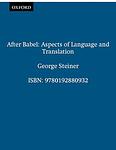George Steiner
George Steiner was a prolific writer, literary critic, and philosopher, renowned for his work on the relationship between language, literature, and society. Born in Paris in 1929 to Austrian-Jewish parents, he grew up speaking three languages, which shaped his lifelong fascination with language and translation. Steiner's extensive body of work includes essays, books, and articles exploring the power and limitations of words, the impact of the Holocaust on culture, the intersections of literature and philosophy, and the role of art and culture in understanding human existence. He held academic positions at several prestigious universities, including Oxford, Cambridge, and Harvard, contributing significantly to literary and cultural studies until his death in 2020.
Books
This list of books are ONLY the books that have been ranked on the lists that are aggregated on this site. This is not a comprehensive list of all books by this author.
-
1. In Bluebeard's Castle
In this thought-provoking work, the author delves into the cultural and moral malaise that has afflicted Western civilization in the aftermath of the Holocaust. Through a series of essays, the text explores the profound impact of this historical atrocity on literature, art, and philosophy, questioning the ability of Western culture to recover from such profound moral failure. The author argues that the Holocaust represents a fundamental crisis in Western civilization, challenging its claims to moral authority and prompting a reevaluation of its cultural achievements. This work is a critical examination of the dark legacy of the 20th century and the shadows it casts on the human capacity for cruelty and the quest for understanding.
The 4630th Greatest Book of All Time -
2. After Babel
"After Babel" explores the intricate realm of translation, delving into its impact on communication, literature, and society. The book argues that translation is a fundamental aspect of human expression and understanding, shaping how we interact and exchange ideas across different languages and cultures. It examines the historical evolution and theory of translation, challenging the notion of exact equivalence between languages and emphasizing the creative, interpretative act of translating. Through a blend of linguistics, philosophy, and literary analysis, the work addresses the complexities and inherent challenges of translation, proposing that every act of communication is, in essence, an act of translation.
The 8932nd Greatest Book of All Time

